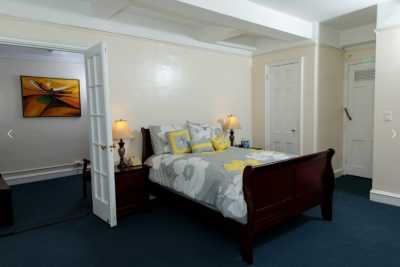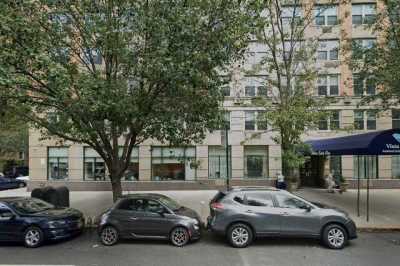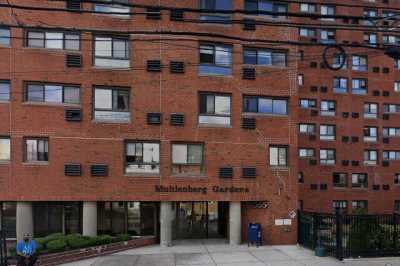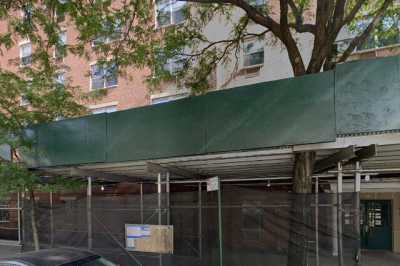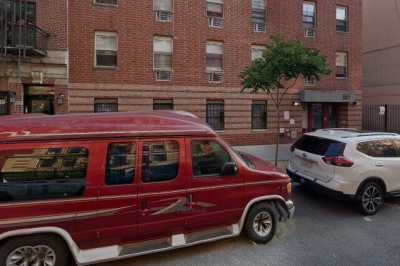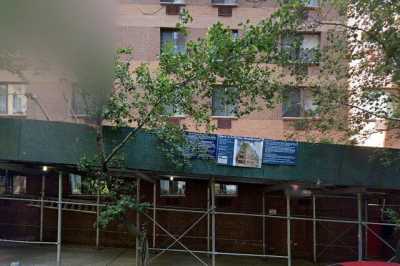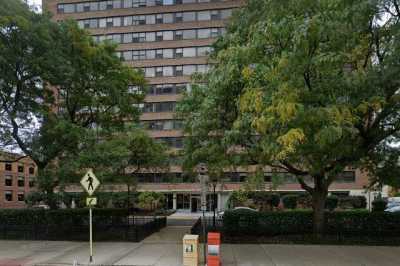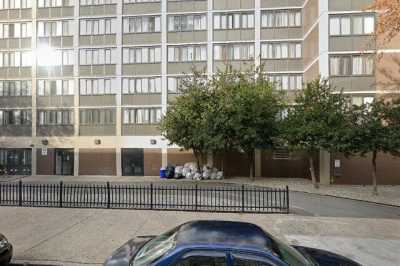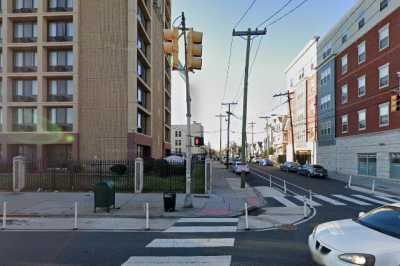
As one of the most well-known tourist spots in America, New York City (NYC) is a highly active metropolitan area. While New York City has fewer senior-specific apartment options, New Jersey has more for older adults looking to stay near the metropolitan area in a 55+ or 62+ community. Senior apartments offer a place where seniors can maintain a level of independence while avoiding social isolation by being surrounded by similarly aged people.
To help you find the senior apartment that suits you best, A Place for Mom has researched senior apartments within a 20-mile radius of New York City Hall in lower Manhattan. Included in this radius are all five boroughs — the Bronx, Brooklyn, Manhattan, Staten Island, and Queens — in New York City and neighboring cities in New Jersey. In this radius, a majority of the senior apartments are located in Queens and New Jersey neighborhoods. However, there are some subsidized senior apartment options in other areas of NYC. Additionally, both NYC and New Jersey offer home-sharing services for seniors, which is an alternative to senior apartments.
In this guide, you’ll learn more about senior apartments in the New York City region. You’ll also find specific information on costs, payment methods, and state and local laws. Overall, this guide offers a one-stop shop for senior-specific housing information, with an inside look into senior resources in the NYC region.
Senior Living Apartments in New York, NY
As one of the most well-known tourist spots in America, New York City (NYC) is a highly active metropolitan area. While New York City has fewer senior-specific apartment options, New Jersey has more for older adults looking to stay near the metropolitan area in a 55+ or 62+ community. Senior apartments offer a place where seniors can maintain a level of independence while avoiding social isolation by being surrounded by similarly aged people.Read more
To help you find the senior apartment that suits you best, A Place for Mom has researched senior apartments within a 20-mile radius of New York City Hall in lower Manhattan. Included in this radius are all five boroughs — the Bronx, Brooklyn, Manhattan, Staten Island, and Queens — in New York City and neighboring cities in New Jersey. In this radius, a majority of the senior apartments are located in Queens and New Jersey neighborhoods. However, there are some subsidized senior apartment options in other areas of NYC. Additionally, both NYC and New Jersey offer home-sharing services for seniors, which is an alternative to senior apartments.
In this guide, you’ll learn more about senior apartments in the New York City region. You’ll also find specific information on costs, payment methods, and state and local laws. Overall, this guide offers a one-stop shop for senior-specific housing information, with an inside look into senior resources in the NYC region.
Senior Apartments Facilities near New York, NY
My loved one was a resident at The Homestead. Based on our experience, I would not recommend this facility to others. The facility needs an upgrade.
I want give my gratitude to those who have worked tirelessly during this holiday and essentially have compromised their own health every day while finding ways to cope without jeopardizing those patients...
Our free advisors can help
- Compare local facilities
- Determine care type
- Schedule tours
- Evaluate pricing
- Costs of senior apartments in the New York City area
- How people pay for senior apartments in New York City
- Understand New York City laws and regulations for senior apartments
- Get to know senior apartments in New York City
- What to expect from senior apartments in New York City
- Explore senior care with confidence
- Unfamiliar with New York City? Highlights for seniors
Costs of senior apartments in the New York City area
Senior apartments in NYC average between $1,698 and $2,407 a month for rent. However, rental costs can be seen as low as $555 and as high as $5,400.[01] These prices vary according to the size, location, and amenities available at the apartment complex. Additionally, some apartments may have homeowner’s association dues or admission fees.
Cost breakdown for senior apartments in the New York City area
The cost for a senior apartment in New York City typically includes the following:
- Rent
- Appliances
- Full kitchen
- Laundry facilities or an in-unit washer and dryer
- Maintenance
Additionally, many apartment buildings may include utilities — air conditioning, heating, and internet access — in the rental fees. However, some apartments are equipped with these utilities, but require additional costs. Some senior apartment buildings in New York and New Jersey add onto typical features with luxurious apartment layouts and safety features like the following:
- Gated/controlled entry
- 24-hour concierge services
- On-site parking
- Wheelchair-accessible rooms
- Private balconies, courtyards, or patios
- 24-hour emergency maintenance
The following chart represents average baseline costs for New York City-area senior apartments without add-on fees. These figures are meant to give you a general comparison of area costs.
Average cost comparisons near New York, NY
Average monthly costs
New York, NY
How people pay for senior apartments in New York City
Since Medicaid, Medicare, and long-term care insurance don’t pay for senior apartment rental costs, as they’re not senior care communities, many seniors use private pay methods to pay. However, health care programs can help seniors pay for in-home health care services that they can receive in their apartment.
Here you’ll learn more about payment methods for rent as well as senior care, including private pay, housing assistance, VA benefits, and Medicaid and Medicare resources.
To pay for senior apartments, many seniors use income sources such as savings, Social Security benefits, pensions, and investment returns. In addition to these options, some seniors pay their senior living rental fees through the following private pay methods:
- Selling a house. If you’re making a permanent move to a senior apartment complex, consider selling your family home. It can help take away the burden of a mortgage and pay off rental fees.
- Reverse mortgage. If you are not making a permanent move or don’t want to sell your family home, consider a reverse mortgage. This allows you to borrow money from the equity you’ve built up in your home.
- Health savings accounts. If you have a high deductible health insurance plan, you can sign up for a health savings account. This can help cover medical care costs.
- Life insurance. Depending on the type of life insurance policy you carry, you may be able to sell or surrender it to fund your senior living expenses.
Veterans and surviving spouses in New York and New Jersey may qualify for a pension or benefits through the U.S. Department of Veterans Affairs (VA). These benefits or pensions can help pay for costs of living or in-home health care costs.
Veterans Pension
A Veterans Pension is a monthly payment for wartime veterans or their surviving spouses that can be used toward monthly rent in a senior apartment. To qualify, you must meet low income standards established by Congress and meet at least one of the following requirements:
- Be 65 or older
- Have a permanent/total disability
- Receive Social Security Disability Insurance
- Receive Supplemental Security Income
VA Aid and Attendance
VA Aid and Attendance benefit is a monthly payment in addition to the pension that can help cover part of senior apartment costs. You must already be receiving the Veterans Pension, be enrolled in VA health care, and have a VA-recognized disability to receive this benefit. Additionally, you must fall under at least one of the following categories:
- Need assistance with some activities of daily living
- Have an untreated illness that results in spending a majority of the day in bed
- Have very limited eyesight
- Already reside in a nursing home
Housebound allowance
The VA Housebound allowance is a benefit that does not cover rental costs, but it can be used toward certain in-home skilled nursing services. This must be used in addition to the Veterans Pension, but cannot be received at the same time as the Aid and Attendance benefit. To qualify, a veteran must have a disability that is 100% disabling that leaves them housebound.
Find a local veteran benefit advocate
To learn more about income support opportunities for veteran seniors in New York City, contact the NYC Department of Veterans’ Services (DVS) or visit the online services at VetConnectNYC.
Local veteran services officers (VSO) can help you understand what benefits you qualify for and how to apply. VSOs can be found at your local VA office. Additional advocacy can be found through the nonprofit organizations Disabled American Veterans or Veterans of Foreign Wars. These groups have service officers who provide veterans assistance and advocacy with disability claims. There are chapters of both located throughout New Jersey and New York. New York also offers local offices for additional veteran organizations, including the American Legion and Paralyzed Veterans of America.
Number of veterans who live in New York City, per the U.S. Census Bureau
About 72% of New York City veterans are 55+, per the U.S. Census Bureau
Resources for New York City veterans
Manhattan Veteran Resource Center
519 8th Ave., Suite 2401
New York, NY 10018
Phone: 212-951-6866
Hours: Monday through Friday, 8 a.m. – 4:30 p.m.
Bronx Veteran Resource Center
2471 Morris Ave., Suite 1A
Bronx, NY 10468
Phone: 718-367-3500
Hours: Monday through Friday, 8 a.m. – 4:30 p.m.
Brooklyn Veteran Resource Center
25 Chapel St., Suite 604
Brooklyn, NY 11201
Phone: 718-630-2830
Hours: Monday through Friday, 8 a.m. – 4:30 p.m.
Queens Veteran Resource Center
75-10B 91 Ave.
Woodhaven, NY 11421
Phone: 718-296-2871
Hours: Monday through Friday, 8 a.m. – 4:30 p.m.
Staten Island Vet Center
60 Bay St.
Staten Island, NY 10301
Phone: 718-816-4499
Hours: Monday through Friday, 9 a.m. – 5:30 p.m.
Bergen County
Contact: Joseph Restivo
Phone: 201-996-8050 / 8051
Fax: 201-996-8009
Joseph.Restivo@dmava.nj.gov
Address: 125 State St., Suite 109
Hackensack, NJ 07601
Hours: Monday through Friday, 8 a.m. – 4 p.m.
Essex/Union Counties
Contact: DeAndre Gurley
Phone: 973-297-3336
Fax: 973-642-0830
DeAndre.Gurley@dmava.nj.gov
Address: 20 Washington Place, Room 431
Newark, NJ 07102
Hours: Monday, Wednesday, Friday, 8 a.m. – 4 p.m.
Hudson County
Contact: Esther Chucaralao
Phone: 201-536-3401
Fax: 201-536-3404
Esther.Chucaralao@dmava.nj.gov
Address: Jersey City Armory
678 Montgomery St., 2nd Floor
Jersey City, NJ 07306
Hours: Monday through Friday, 8 a.m. – 4 p.m., closed alternate Fridays
While New York State Medicaid and New Jersey Medicaid do not cover rental costs for senior apartments, they do cover medically necessary in-home health care services.
New York Medicaid for senior apartments
New York State Medicaid can help cover multiple medical services, including home care. However, whether you are eligible can depend on various factors, including the following:
- Age
- Disability
- Income
- Household/Family Size
- Residence{{citation:3, 4}}
In addition to these factors, you may be eligible for NY State Medicaid if you are eligible for certain programs:
- Medicaid Savings Program
- COBRA
- AIDS Health Insurance Program
- Medicaid Buy-in Program for Working People with Disabilities[03]
Additional requirements can be found on the NY Medicaid — How to Apply web page. The way you apply for NY State Medicaid changes depending on your eligibility requirements, so contacting your local Department of Social Services or NY State of Health can help you determine where and how to apply.
To help cover in-home care costs, you may also be eligible for Medicaid-related programs in New York, such as these:
- Long Term Home Health Care Program: This program is for adults who qualify for nursing home care but decide to remain in their home with in-home care services.
- Programs of All-Inclusive Care for Elderly (PACE): This program is for seniors ages 55+ who qualify for nursing home care. PACE helps them arrange long-term care services in their home.
- Managed Long-Term Care Program: This program helps cover costs for in home services, including, but not limited to, home health aides and home attendant services.
Additionally, seniors aged 60+ can contact the NYC Department for the Aging, which can help you find in-home care through their partnership with case management agencies.
New Jersey Medicaid for senior apartments
New Jersey seniors aged 65 and older, and adults with a disability, may qualify for the NJ FamilyCare Aged, Blind, Disabled (ABD) Program. However, to qualify, you must not be receiving Supplemental Security Income (SSI) and meet the income SSI standards, as well as undergo the following:
- Pass a financial evaluation from the local County Welfare Agency
- Pass a clinical evaluation from the Division of Aging Services
ABD covers long-term services and support, which can be provided within your home. These care services may include the following:
- Home-delivered meals
- Care management
- Personal care services[05]
Medicaid benefits are difficult to understand and apply for, which is why every borough has Certified Application Counselors (CAC) available in the local Medicaid office. CACs can help assist you in the application process. Additionally, contacting your local department of aging or long-term care ombudsman can help you understand your rights as a senior. The NYC Department of Aging has an informational referral service called Aging Connect to help you find programs and services near you.
New York City resident Medicaid resources
Rider Community
Address: 305 Rider Ave., 4th Floor
Bronx, NY 10451
Phone: 718-585-7872
Hours: Monday – Friday 8:30 a.m. to 5 p.m.
Fordham
Address: 2541-2549 Bainbridge Ave.
Bronx, NY 10458
Phone: 929-252-3230
Hours: Monday – Friday 9 a.m. to 5 p.m.
Coney Island
Address: 1912 Mermaid Ave.
Brooklyn, NY 11224
Phone: 929-221-3790
Hours: Monday – Friday 9 a.m. to 5 p.m.
East New York
Address: 404 Pine St., 2nd Floor
Brooklyn, NY 11208
Phone: 929-221-8204
Hours: Monday – Friday 9 a.m. to 5 p.m.
Kings County Hospital
Address: 441 Clarkson Ave.
“T” Building, Nurses’ Residence, 1st Floor
Brooklyn, NY 11203
Phone: 718-221-2300. Ext. 2301
Hours: Monday – Friday 9 a.m. to 5 p.m.
Brooklyn South
Address: 785 Atlantic Ave., 1st Floor
Brooklyn, NY 11238
Phone: 929-221-3502
Hours: Monday – Friday 8:30 a.m. to 5 p.m.
Chinatown
Address: 115 Chrystie St., 5th Floor
New York, NY 10002
Phone: 212-334-6114
Hours: Monday – Friday 9 a.m. to 5 p.m.
Dyckman Community
Address: 4055 10th Ave., Lower Level
New York, NY 10034
Phone: 212-939-0207 Ext. 0208
Hours: Monday – Friday 8:30 a.m. to 5 p.m.
Queens Community
Address: 32-20 Northern Blvd., 3rd Floor
Queens, NY 11101
Phone: 718-784-6729
Hours: Monday – Friday 8:30 a.m. to 5 p.m.
Jamaica Community
Address: 165-08 88th Ave., 8th Floor
Jamaica, NY 11432
Phone: 929-252-3193
Hours: Monday – Friday 9 a.m. to 5 p.m.
Staten Island
Address: 215 Bay St.
Staten Island, NY 10301
Phone: 929-221-8823/8824
Hours: Monday – Friday 9 a.m. to 5 p.m.
New York Medicaid helpline: 800-541-2831
Call Aging Connect: 212-244-6469 or 3-1-1
Essex/Hudson Counties
153 Halsey St., 4th Floor
Newark, NJ 01702
Phone: 973-648-3700
Hours: Monday and Thursday, 8 a.m. – 8 p.m. / Tuesday, Wednesday, Friday, 8 a.m. – 5 p.m.
Bergen County
100 Hamilton Plaza, 5th Floor
Paterson, NJ 07505
Phone: 973-977-4077
Hours: Monday through Friday, 8 a.m. – 5 p.m.
Union County
100 Daniels Way, 1st Floor
Freehold, NJ 07728
732-863-4400
Hours: Monday and Thursday, 8 a.m. – 8 p.m. / Tuesday, Wednesday, Friday, 8 a.m. – 5 p.m.
Medicare is a federal health insurance program for seniors aged 65 and older and people with permanent disabilities or certain diseases. Medicare does not cover rental costs for senior apartments. However, Medicare Plan A can be used towards certain medically necessary short-term in-home care services, including the examples below:
- Part-time home health aide care
- Part-time skilled nursing care
- Physical, occupational, and speech-language therapy
- Medical equipment
- Medical supplies
- Medical social services
- Injectable osteoporosis drugs for women[06]
If you’re in need of home health care services, New York Department of Health helps seniors find this care through their partnership with the home health agency, Carina. In addition to health insurance, New York and New Jersey have multiple financial assistance programs for low-income seniors.
New York Medicare financial assistance programs
New York residents may qualify for additional financial assistance for health care services through the following programs:
- Medicare Savings Program (MSP) helps you with Medicare premium costs. In addition to MSP, you are automatically enrolled in Extra Help, a federal program that helps with prescription drug costs.
- Elderly Pharmaceutical Insurance Coverage (EPIC) Program helps seniors aged 65 and over to receive help with fees from their Medicare Plan D benefits.
New Jersey Medicare financial assistance programs
- Pharmaceutical Assistance to the Aged & Disabled (PAAD) helps seniors and adults with a disability pay for prescription drugs.
- Senior Gold Prescription Discount Program is a prescription drug program for seniors and adults who do not meet the income requirements for PAAD. Additionally, this program has a different copay method than PAAD.
- NJ Save helps low-income or disabled seniors with Medicare premium costs, prescription costs, and other medical costs.
A local counselor through the State Health Insurance Assistance Program (SHIP) can help assist you with applying for these Medicare benefit programs. Additionally, you can contact the local Social Security office for more information on what programs and benefits you qualify for. For additional assistance, contact the NYC Department for the Aging, which offers free Medicare orientation sessions. Your local long-term care ombudsman can also help advocate for seniors’ health care rights, as well as help you understand the local public health care options available to you.
New York City resident Medicare resources
NYC Ombudsman
Paula Goolcharan
Center for Independence of the Disabled
1010 Avenue of the Americas, Suite 301
New York, NY 10018
Email: pgoolcharan@cidny.org
For Bronx, New York, and Richmond counties:
Phone: 212-812-2901
For Kings and Queens counties:
Phone: 212-812-2911
New Jersey Long-Term Care Ombudsman
Laurie Facciarossa Brewer
Visit the New Jersey Long Term Care Ombudsman website
P.O. Box 852
Trenton, NJ 08625
Phone: 877-582-6995
Email: ombudsman@ltco.nj.gov
Phone: 800-792-8820
Housing Choice Voucher (HCV) program, formerly Section 8
Housing Choice Voucher (HCV) program, previously known as Section 8, is a program through the Department of Housing Preservation and Development (HPD) that helps low-income seniors with rent assistance for their apartment. However, you should first ask your prospective senior apartment landlord whether they accept these vouchers and if the building meets the program requirements.
New York City and New Jersey Home Sharing
New York Home Sharing: The New York Foundation for Senior Citizens offers a free program called Home Sharing. This program helps match New York City seniors aged 60 or older to other adults interested in shared housing. After matching, they will share a living space to help alleviate financial burdens. Additionally, seniors age 55+ can apply to be hosts who will share their living space with disabled adults (i.e., home sharing guests).
New Jersey Home Sharing: The nonprofit agency HomeSharing, Inc. offers an affordable housing option in New Jersey. The agency matches providers (those providing housing) with seekers (those looking for housing). While this service is available to all age groups, providers are typically seniors with a fixed income that need additional help with a mortgage. By taking in a “seeker,” seniors can remain in their home while meeting all their mortgage payments.
New Jersey Congregate Housing Services Program (CHSP)
New Jersey Congregate Housing Services Program (CHSP) is a state-funded program that helps low-income seniors and adults with disabilities receive supportive services. Some of those supportive services can include the following:
- At least one meal daily
- Homemaker services like housekeeping and laundry
- Shopping assistance
- Meal preparation
- Personal care (i.e., assistance with activities of daily living)
CHSP is only available to those who live in a subsidized housing facility that is contracted with the state.
Social Security benefits
In addition to local assistance programs, many seniors pay for rental costs with their Social Security benefits:
- Social Security in retirement: After an adult aged 62 and older is no longer working or reduces their working hours, they may qualify for a monthly check through Social Security Retirement benefits. To be eligible, you must have work credits where Social Security taxes were paid for 10 or more years.
- Social Security Disability Insurance (or SSDI): Adults that have worked recently, have work credits, and have an eligible disability may qualify for Social Security Disability Insurance (SSDI). An eligible disability must be permanent, meaning you must have had it for at least one year, or expect it to result in death. Social Security determines whether you have enough work credits based off of yearly wages and income. Once you retire, this may roll over into your Social Security retirement.
- Supplemental Security Income (or SSI): Seniors aged 65 and older, or adults with a disability, with limited income and few work credits may qualify for Supplemental Security Income.
- Social Security survivors pension: Widows and widowers may qualify for Social Security survivors pension, which offers benefits based off of the deceased’s work credits. Seniors aged 60 and over may be eligible to receive monthly payments, however some may only receive a one-time payment.
Find help with your local public assistance benefits by contacting your local Social Security office and HUD offices.
New York City resident public assistance resources
Jacob K. Javits Federal Building
(Broadway – between Duane and Worth Streets)
26 Federal Plaza, Suite 3541
New York, NY 10278
Phone: 212-264-8000
One Newark Center
1085 Raymond Blvd., 13th Floor
Newark, NJ 07102-5260
Phone: (973) 776-7200
The PeopleCare Center
120 Finderne Ave.
Bridgewater, NJ 08807
Phone: 908-526-4663
Email: Info@homesharing.org
Understand New York City laws and regulations for senior apartments
Senior apartments must abide by state apartment regulations. New York City apartment buildings must have a Certificate of Occupancy. As part of the process of obtaining a certificate, the Department of Buildings must conduct inspections.[07] Likewise, New Jersey condominiums must undergo an inspection by the Bureau of Housing Inspection every five years.[08]
While senior apartments are required to abide by the Fair Housing Act and New Jersey laws against discrimination, many senior apartment buildings have their own age requirements. Typically, senior apartments are labeled as 55+ or 62+ communities. This information can typically be found on the senior apartment website or by contacting the apartment building owner.
New York apartment regulations
Senior apartment accessibility
The New York City Department of Housing Preservation and Development (NYC HPD) has specific design recommendations for senior housing. The Office of Development’s Division of Building and Land Development Services (BLDS) recommends the following:
- Handrails in the corridors
- Emergency pull-cords in bathrooms
- Grab bars in bathrooms
- Uniform Federal Accessibility Standards (UFAS) standards, such as the following:[09]
- At least one accessible common area must be available.
- Accessible areas must be slip-resistant, stable, and firm.
- Stairways must have handrails on each side.
- There must be an adequate number of handicap parking spaces, depending on the lot size.[10]
Rental regulations
Building owners must provide a safe and clean living environment by meeting the following types of requirements:
- Maintain hot and cold water, electrical, plumbing, appliances, sanitary, ventilating systems, lighting, and heat
- Conduct repairs in a timely manner
- Keep public areas free of garbage
- Address issues, including leaks, mold, and pests
- Have smoke detectors and carbon monoxide detectors installed
- Have a peephole in each apartment’s entrance door{{citation:11, 12}}
Additional regulations may be required depending on the size of the apartment building and how many units are offered in the apartment building. In addition to building maintenance, landlords must follow additional rental agreement rules, including, but not limited to, the following:
- Landlords cannot lock tenants out.
- Rent is not considered late until it has been over five days since the due date.
- Late fees cannot be more than $50 or 5% of the tenant’s monthly rent.
- A receipt must be provided after rent is paid.{{citation:11, 12}}
To see whether these guidelines are being met, you can visit the NYC Department of Buildings, where you can find inspection reports for apartment buildings.
Depending on the type of apartment building, landlords could raise rental costs when renewing a lease. However, seniors aged 62 and older, or adults living with a disability, may be exempt from rent increases when living in an apartment categorized as one of the following:
- Rent-regulated
- Low-Income Housing Tax Credit (LIHTC)
- Limited Dividend
- Redevelopment
- Housing Development Fund Corporation (HDFC)
- Mitchell-Lama cooperatives and rentals[12]
To find out whether you qualify for Senior Citizen Rent Increase Exemption (SCRIE) or Disability Rent Increase Exemption (DRIE), contact the NYC Department of Finance.
If you are age 62+ and your care needs change and you need to move due to medical reasons or to an adult care facility, you may be entitled to terminate your lease under Executive Law 292 (21) or Real Property Law §227-a(1). Additionally, rent-controlled and rent-stabilized apartments in NYC can evict seniors due to owner occupancy only if the senior is offered a similar apartment for the same or lower price.[12] Please consult a landlord and tenant attorney for more.
New Jersey apartment regulations
Rental regulations
Landlords must provide clean living environments that do not endanger tenants. This includes maintaining a pest- and hazard-free apartment building with the following basics provided:
- Heat
- Building security with every unit having a lock
- Smoke alarm detectors
- Carbon monoxide alarms
- Plumbing
- Electrical systems[13]
Additionally, tenants must maintain their apartment and report any violations of these requirements.
When living in a senior apartment, seniors have their own rights, including a five-business-day grace period for late rent fees. Regardless of pet policies, a senior housing project must allow pets for senior tenants in compliance with the Pets in Housing Projects Law. However, the senior must give written notice to the landlord about the pet, and lease renewals can be denied if the situation with the pet faces any of the following issues:
- In violation of building, health, or use codes, whether it is federal, local, or state
- Not cared for by the tenant
- Not under control behaviorally
- Not confining defecation to areas other than common areas, entrances, or exits
- Not properly cleaned up after (disposal of pet waste)[13]
Seniors are protected from changes to the lease under the Senior Citizens and Disabled Protected Tenancy Act. To qualify under the Senior Citizens and Disabled Protected Tenancy Act, a senior must meet one of the following requirements:
- Be aged 62 or older prior to the conversion date
- Have a permanent disability
- Be honorably discharged from the military while being at least 60% disabled[13]
You can find inspection reports for apartment buildings through the State of New Jersey Department of Community Affairs (DCA). Additional information on your rights as a tenant and landlord guidelines can be found in the DCA Truth In Renting guide.
COVID-19 regulations for New York City senior apartment communities
As COVID-19 restrictions set forth by the Center for Disease Control and Prevention begin to relax, so do individual state regulations. The New Jersey Department of Health have relaxed their COVID-19 regulations and are no longer enforcing specific COVID-19 regulations in regards to indoor public areas.[14]
However, New York City Department of Health has a mask advisory in place which strongly encourages wearing masks in indoor public areas or crowded outdoor areas. Additionally, under New York State guidance, those who have tested positive for COVID-19 are supposed to isolate at home for five days and continue wearing a mask in public and around other people for 10 days.[15]
The city also recommends that high-risk individuals, like seniors, take these precautions:
- Ask others to wear masks around you.
- Ask visitors to test negative for COVID-19 prior to their visit.
- Limit the attendance allowed in indoor areas.[15]
Additionally, seniors can call 855-429-1168 for help with scheduling vaccinations. The state of New Jersey has a COVID-19 hub for any related questions.
Learn more about New York City COVID-19 regulations
Get to know senior apartments in New York City
418
72
What to expect from senior apartments in New York City
Between New York and New Jersey, the New York City region has many different apartment options for seniors. Whether you’re looking for a budget-friendly apartment or a luxurious lifestyle, there are options for you. Below is a breakdown of what you can expect to see from senior apartments in the New York City area.
New York vs. New Jersey
While New York City is a large metropolitan area, it lacks senior apartment options. Four out of five boroughs have few to no apartment buildings dedicated to senior citizens. Almost all of New York City’s senior apartments on the New York side are located in Queens.
However, across the New Jersey border and outside NYC proper, seniors will find more senior apartments. The 20-mile radius from New York City Hall in lower Manhattan broadens the number of senior apartments. You can find senior apartments in the following New Jersey cities:
- Newark
- Elizabeth
- East Orange
- Clifton
- Irvington
- Paterson
- Woodbridge
- Union
- Colonia
- Perth Amboy
- Avenel[01]
Luxury senior apartments
Seniors can live in luxury with a handful of extravagant senior apartments in the New York City region. If you’re looking for beautiful granite countertops, resort-like amenities, and everything within walking distance, there are several options available.
Some senior apartments in the New York City region add luxurious touches to their apartments, including, but not limited to, the following features:
- Walk-in closets
- Lushly carpeted floors
- Marble bathrooms
- Stainless-steel appliances
- High ceilings
- Bay windows
In addition to high-end finishes in apartments, some seniors may have access to on-site amenities, such as these:
- Pools
- Fitness centers
- Resident activities and lounges
- Putting greens
- Walking trails
- Courtyards
- Indoor garages
- Gardens
Budget-friendly senior apartments
The New York City area is known for a high cost of living, so finding an affordable housing program may be beneficial. Both New York City and New Jersey offer affordable apartment options for seniors.
The New York City region has many subsidized senior apartment buildings. Most of the apartments in boroughs other than Queens are provided through the New York Foundation for Senior Citizens (also known as NYFSC). This helps provide affordable housing options for low-income seniors.[17] Likewise, New Jersey has multiple subsidized senior apartments, which are specifically designed for low-income older adults aged 62 and older or for those who have a disability.
Find and apply for NYFSC affordable housing
Explore senior care with confidence
Know where to start.
Identify the right care for your loved one with our free assessment.

See what you can afford.
Understand cost and payment for long-term care based on your loved one's needs.

Find top facilities for you.
Free, personalized guidance from our Senior Living Advisors can help you narrow your search.

Tour your favorite facilities.
Our free touring checklist can help you choose the right community.
Unfamiliar with New York City? Highlights for seniors
2423700
Number of seniors over the age of 55 currently living in New York City, according to the U.S. Census Bureau
Percentage of seniors 55 and older within the New York City population, according to the U.S. Census Bureau
31301
Mean retirement income of seniors 60+ in New York City, according to the U.S. Census Bureau
Health care for seniors in New York City
The New York City area provides access to some of the most reputable hospitals. Some have received national recognition for geriatrics and other adult specialties. Below you’ll find those that receive the highest rankings in the New York City area.

NYU Langone Health
NYU Langone Health is recognized as the best hospital in New York, ranking No. 1 regionally and No. 3 nationally. Seniors can receive top-notch care at this hospital, which ranks No. 3 in the nation for geriatrics. In total, the hospital system ranks nationally for 14 different adult specialties, according to U.S. News and World Report.

New York-Presbyterian
New York-Presbyterian is nationally recognized and ranked at No. 6 for geriatrics and No. 7 overall. The hospital is ranked No. 2 in the region and highly rated for 14 adult specialties, according to U.S. News and World Report.

Mount Sinai Hospital
Mount Sinai Hospital offers remarkable care for seniors with a national ranking of No. 1 for geriatrics. In addition to being nationally recognized for 11 adult specialties, the hospital ranks third in New York and 16th nationally, according to U.S. News and World Report.

Jersey City Medical Center
Jersey City Medical Center, part of the RWJ Barnabas Health System, is located in Hudson County. This hospital is an Advanced Life Support provider, Regional Trauma Center, and Regional Heart Hospital. They are also highly rated for their nursing excellence program and leadership roles in LGBTQ+ Healthcare Equality.
Transportation for seniors in New York City
As a large metropolitan area, New York City offers many transportation options, including buses, subways, railroads, and taxis. Because New York City residents have an abundance of transportation options and parking is expensive, many do not own a vehicle. However, all of A Place for Mom’s NYC senior apartment partners offer on-site complimentary transportation services to ensure seniors get out and about.[16]
Seniors aged 65 and older with a disability may qualify for a Reduced-Fare MetroCard for the subways and buses. If a disability prevents you from using the local buses and subways, you may be able to utilize the Paratransit Service, Access-A-Ride.
To learn more about the local transportation options available to area seniors, contact the local Office of Aging.
Walk Score rates New York City’s transportation accessibility on a 100-point scale.[21]

88
Walk Score

89
Transit Score

69
Bike Score
Senior activities in New York City
New York and New Jersey offer a variety of indoor and outdoor areas. With New York City being a large metropolitan area, it’s full of tourist attractions and local hotspots, with many accessible facilities, activities, and programs. However, just across the border in New Jersey, seniors have access to more outdoor and historical areas.
Entertainment and museums
New York City is a lively and highly populated metropolitan area with a large range of entertainment options, from a long list of tourist attractions to museums. Whether you’re a local senior or visiting family member, tourist spots and Broadway shows are a must-see.
Besides these entertainments, you can enjoy a variety of art, history, and science museums at a discounted price with senior discounts available for adults aged 65 and older. These museums include the following:
- Staten Island Museum
- The Metropolitan Museum of Art
- Rubin Museum of Art
- The American Museum of Natural History
Local areas of interest for seniors in Queens
While living in a senior apartment in Queens, New York, you’ll have access to a variety of indoor and outdoor activities. The only casino in NYC, Resorts World New York City, is located in the borough of Queens.
Queens, New York, has its own local attractions, including the following family-friendly options:
Beyond indoor activities, the borough of Queens includes many outdoor areas with miles of beaches off of the Atlantic Ocean.
Local areas of interest for seniors in New Jersey
While many may think NYC is the go-to spot, there are many fun spots across the border in New Jersey. New Jersey has many parks and outdoor areas with waterfalls, including the 25-foot waterfall at South Mountain Reservation and the 77-foot waterfall at Paterson Great Falls. Seniors aged 62 and older qualify for a Lifetime Senior Pass or an Annual Senior Pass to federal recreation sites with a 50% discount for facilities and services.
Besides outdoor activities, this region in northern New Jersey has multiple indoor entertainment options, such as these cultural gems:
New York senior centers and programs
Local older adult centers (OAC), also known as senior centers, offer New York residents age 60+ a free membership where they can attend classes and participate in stimulating activities.
Additionally, you may qualify for a discounted membership to local recreation centers. The NYC Department for the Aging can help you find a local OAC or senior program.
New Jersey senior centers and programs
The New Jersey Department of Human Services Division of Aging Services partners with GetSetUp, an online platform offering virtual learning classes. This partnership benefits New Jersey residents aged 60 and older. With hundreds of online classes, seniors can join fitness classes, learn new hobbies, explore technology, and gain new skills.
Additionally, the department also offers local programs to seniors in New Jersey. This includes HealthEase, a program that offers coordinated screening, walking programs, exercise classes, and educational courses. Some subdivided programs are age-restricted.
New Jersey also has senior centers where seniors can experience activities, education, and similar services.
Frequently asked questions
Clover Hill Senior Living, Vista on 5th and Trinity Senior Apartments are the top-rated Senior Apartments facilities near New York, NY. These Senior Apartments facilities received the highest rankings based on verified family reviews. See full list of communities.
The average cost of Senior Apartments in New York is 1845.93 per month. This cost may vary based on location, amenities, floorplan, level of care and other factors.
References
Apartments.com. (2023). New York, NY: Senior housing.
United States Census Bureau. (2021). Veteran status (S2101) [Data set]. American Community Survey.
New York Department of Health. (2023, February). How to apply for NY Medicaid.
New York Department of Health. (2020, October). Consumer guide to Community-Based Long Term Care.
New Jersey Department of Health. The NJ FamilyCare Aged, Blind, Disabled Programs.
Medicare. Home health services.
New York City Department of Buildings. What to expect during an inspection.
State of New Jersey Department of Community Affairs. Bureau of Housing Inspection.
NYC Department of Housing Preservation & Development. (2016, May 2). HPD design guidelines.
U.S. Access Board. (1986, April 16). Uniform Federal Accessibility Standards (UFAS).
NYC Department of Housing Preservation & Development (2021). ABC’s of housing.
Office of the New York State Attorney General. Residential tenants’ rights guide.
New Jersey Department of Community Affairs. Truth in renting.
State of New Jersey Governor Phil Murphy. (2021, May 24). Governor Murphy lifts major COVID-19 restrictions, moves forward with most significant reopening steps to date.
New York City Department of Health and Mental Hygiene. (2022, December 9). Advisory from the commissioner of Health & Mental Hygiene of the City of New York.
A Place for Mom. (2022-2023). A Place for Mom proprietary data.
New York Foundation for Senior Citizens. Affordable housing.
United States Census Bureau. (2021). Age and sex (S0101) [Data set]. American Community Survey.
United States Census Bureau. (2021). Population 60 years and over in the United States (S0102) [Data set]. American Community Survey.
U.S. News and World Report. (2023, January 13). Hospital search.
Walk Score. Living in New York.

More questions?
Ask an A Place for Mom local advisor at no cost.
- Brooklyn, New York
- Bronx, New York
- Roselle, New Jersey
- Yonkers, New York
- Jersey City, New Jersey
- Lyndhurst, New Jersey
- Glen Rock, New Jersey
- Saddle Brook, New Jersey
- Fair Lawn, New Jersey
- Hasbrouck Heights, New Jersey
- West Orange, New Jersey
- Union, New Jersey
- Westwood, New Jersey
- North Arlington, New Jersey
- Syosset, New York
- Elizabeth, New Jersey
- Linden, New Jersey
- Lodi, New Jersey
- Paterson, New Jersey
- Hoboken, New Jersey

